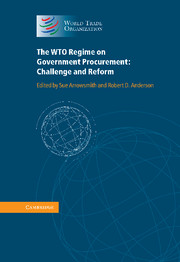Book contents
- Frontmatter
- Contents
- List of contributors
- Foreword by Pascal Lamy
- Perspective of the Chairman of the WTO Committee on Government Procurement, Nicholas Niggli (Switzerland)
- Preface
- Disclaimer
- PART I The WTO regime on government procurement
- PART II Expanding the scope of the Agreement on Government Procurement: accession and coverage
- PART III Revision of the procedural rules and other transparency provisions of the Agreement on Government Procurement
- PART IV Developing countries in the WTO procurement regime
- PART V Economic and social development (horizontal policies) in government procurement
- PART VI Enforcement and remedies
- PART VII Multilateralism and regionalism
- 20 Government procurement provisions in regional trade agreements: a stepping stone to GPA accession?
- 21 A case study of regionalism: the EC–CARIFORUM Economic Partnership
- PART VIII Challenges and new directions
- Index
20 - Government procurement provisions in regional trade agreements: a stepping stone to GPA accession?
from PART VII - Multilateralism and regionalism
Published online by Cambridge University Press: 07 September 2011
- Frontmatter
- Contents
- List of contributors
- Foreword by Pascal Lamy
- Perspective of the Chairman of the WTO Committee on Government Procurement, Nicholas Niggli (Switzerland)
- Preface
- Disclaimer
- PART I The WTO regime on government procurement
- PART II Expanding the scope of the Agreement on Government Procurement: accession and coverage
- PART III Revision of the procedural rules and other transparency provisions of the Agreement on Government Procurement
- PART IV Developing countries in the WTO procurement regime
- PART V Economic and social development (horizontal policies) in government procurement
- PART VI Enforcement and remedies
- PART VII Multilateralism and regionalism
- 20 Government procurement provisions in regional trade agreements: a stepping stone to GPA accession?
- 21 A case study of regionalism: the EC–CARIFORUM Economic Partnership
- PART VIII Challenges and new directions
- Index
Summary
Introduction
The majority of regional trade agreements (RTAs) that have been notified to the World Trade Organization (WTO) in recent years contain provisions on government procurement, whether of a detailed or a limited nature. Such provisions are of interest for a number of reasons, some specific to the field of government procurement and some general or systemic. To begin with, government procurement provisions in RTAs are of importance in their own right, in that, in many jurisdictions, they go a long way to establish the prevailing conditions of trade and competition in public procurement markets. This impact may be manifested through both behavioural rules that regulate procurement procedures and through coverage schedules that subject specific procurements to international competition. As such, government procurement provisions in RTAs can directly affect performance in a key economic sector with implications for economy-wide economic development and growth.
Second, provisions on government procurement in regional trade agreements provide an important point of comparison with the WTO Agreement on Government Procurement (GPA). In broad terms, both the GPA and government procurement provisions in RTAs address the same subject matter – i.e. the application of non-discrimination principles, rules for the conduct of procurement, etc. As such, RTA provisions may suggest alternative ways of addressing matters that are also addressed in the GPA. On the other hand, to the extent that RTA provisions on government procurement broadly parallel and appear to borrow from corresponding provisions of the GPA, they may validate and even extend the influence of these provisions beyond GPA Parties.
- Type
- Chapter
- Information
- The WTO Regime on Government ProcurementChallenge and Reform, pp. 561 - 656Publisher: Cambridge University PressPrint publication year: 2011
- 12
- Cited by



